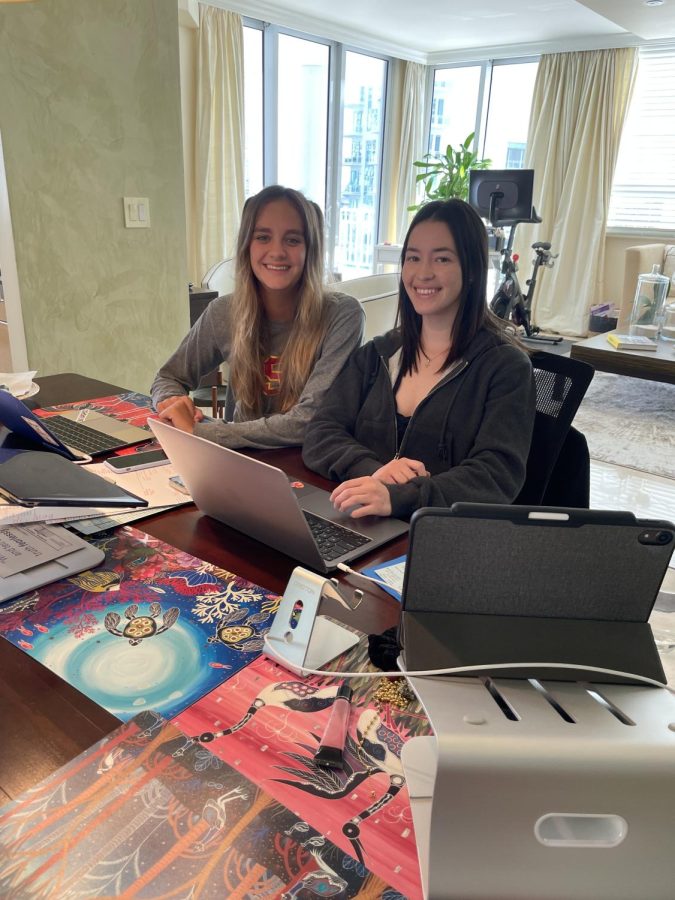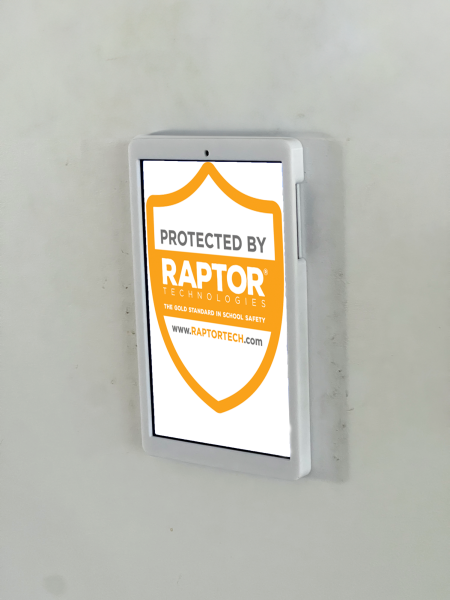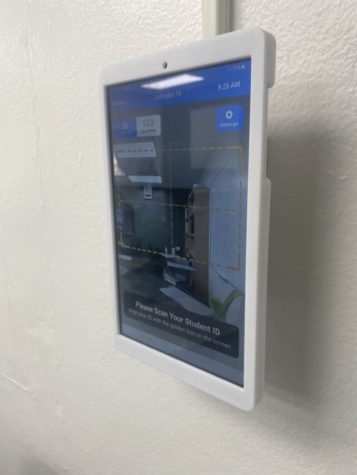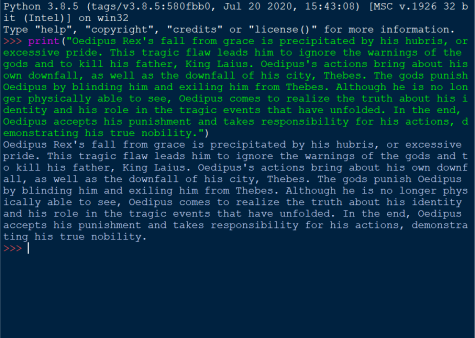The pros and (mostly) cons of virtual speech and debate
Cecilia Granda-Scott ’22 and Nicole Rodriguez ’22 preparing for a virtual competition.
Since freshman year, Dina Kaplan ’22 has been an avid participant in the Ransom Everglades Speech and Debate Team. She, along with her teammates, said that the highlight of RE Speech and Debate competitions is the experience of rooming, traveling, and practicing together, which connects students across different grade levels.
Staying in Miami and competing online is a different story. “[It makes us feel] very disconnected from our team,” Kaplan said. The team “works less collaboratively and more individually,” she explained.
Like many teams and activities at RE, the RE Speech and Debate Team was forced to move online with the onset of the COVID-19 pandemic, and they have been competing virtually for the past two years. Since last December, the team has started to compete in person again, especially in local competitions. Many major tournaments are still online, however, and the virtual format is still common. On a team that now numbers 133 students, there are freshmen and sophomores who have never experienced what it is like to debate in person.
From the perspective of RE Speech and Debate Coach Kate Hamm, “kids do not get to experience speech and debate” in Zoom competitions. Instead, “they are just experiencing talking to a screen.” When students participate in a speech or debate event at home, they are told to find a room to sit in alone, where they log in to the hours-long Zoom meeting through which they compete. But the technology is unreliable, and expressing oneself is problematic on a buffering computer screen.
“Speech and debate is all about communication; communication is all about adapting your message to your audience,” Coach Hamm said. This task is challenging online.
“There are technology issues all the time where one will cut out, and someone will miss something one says,” added Kaplan. If this ensues, the judges will make the student give their speech again—something that “would not be allowed” if it had happened in an in-person competition. Kaplan recalled one of her worst experiences when she was competing virtually in her apartment. While she was in the middle of debating, the fire alarm went off, and she was forced to compete in the hallway.
Ella Gonzalez ’24 began participating in Speech and Debate in the fall of 2020 as a freshman. Because she joined the team amidst the pandemic, she has only participated in remote competitions. Still, she said that keeping up with online events has grown increasingly difficult. Though she has grown accustomed to competing in “the comfort of her own home,” she wants to travel and participate in live competitions. It was one of the reasons she joined in the first place. More importantly, she longs for the “support from her friends” that she can only get in an in-person setting.
Some virtual events, such as Public Forum and World Schools, add an additional layer of complication because students compete with partners. Amelia Fox ’22, who currently serves as president of the team, said that this aspect has challenged her the most while online. She explained that not being “right next to her partner during a round” made it difficult to figure out their next set of arguments, a crucial step in these partnered events. To help combat this situation, the debating duo turned to FaceTime calls to plan their next move—but even this one-on-one interaction “is not the same.”
Lucas Carvalho ’23, who participates in Public Forum as well, has faced similar challenges. “One of Public Forum’s key characteristics is being able to have heated discussions between teams in person, and virtual tournaments have not allowed us to have it,” he said, noting the key differences between remote and in-person competition.
Sol Robert ’22, a competitor in extemporaneous speaking, said the worst part about going online is that she “can no longer interact with competitors across the nation and make friends from other schools.” Speech and debate is not only about competing; team members also mentioned the benefits of meeting people from around the world and connecting with them. In virtual events, sometimes they only know their competition by the name on their Zoom box.
In Robert’s view, “It is harder to win on merit because there are many chances to cheat by having notes pasted or scripts up [while on Zoom],” she explained. Going to an in-person event forces students are to play by the rules, only memorizing their scripts and using the allowed materials. The only way organizers have been able to curb foul play in online matches is by changing the rules themselves: competitors can now use the internet to look up arguments.
The Zoom shift does have some upsides, though. In many ways, having competitions accessible from a computer rather than forcing students to travel miles and stay multiple nights at hotels to participate has made the activity more affordable. “It has allowed for students from other parts of the world to be able to compete,” Hamm said. “Students from China used to always fly to the United States and compete, but this way they can do it without spending money on a flight.”
Even so, as more competitions return to an in-person format, members of the team are excited to test their skills on the physical stage. “The personal aspect of seeing your opposition and judge in a live event gives the debate that much more excitement,” Carvalho said. “Hopefully, we can see more of that.”

Ella Kuppers '22 is a staff writer and social media editor for The Catalyst. She specializes in the Opinion section.

Luca Campiani ‘22 is a Co-Editor in Chief and writer for The Catalyst. He covers the Features and News sections of the newspaper.











